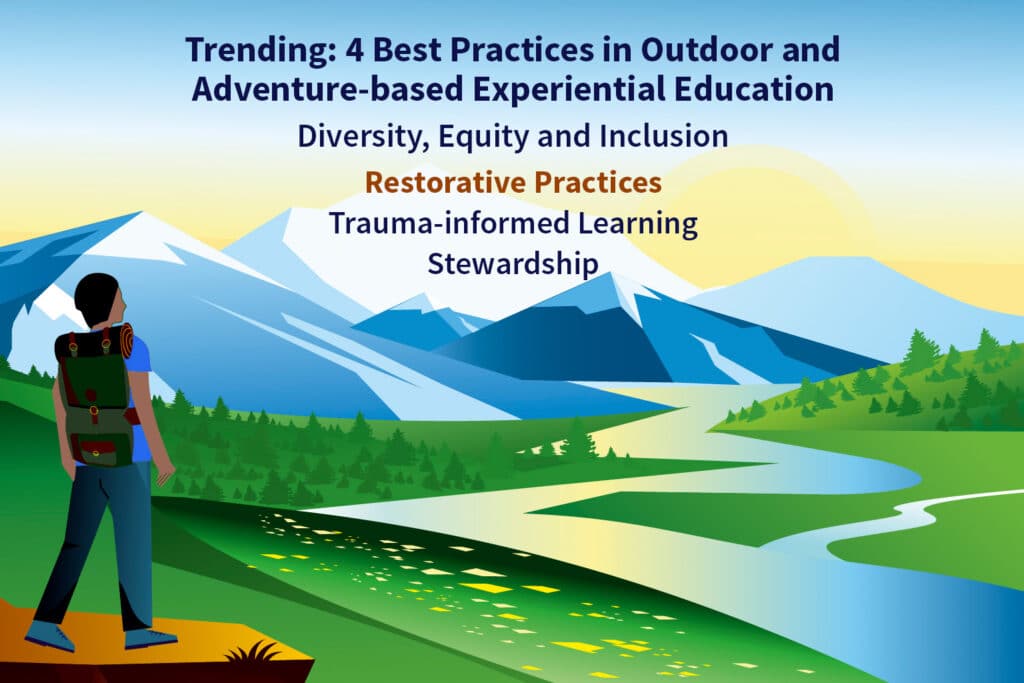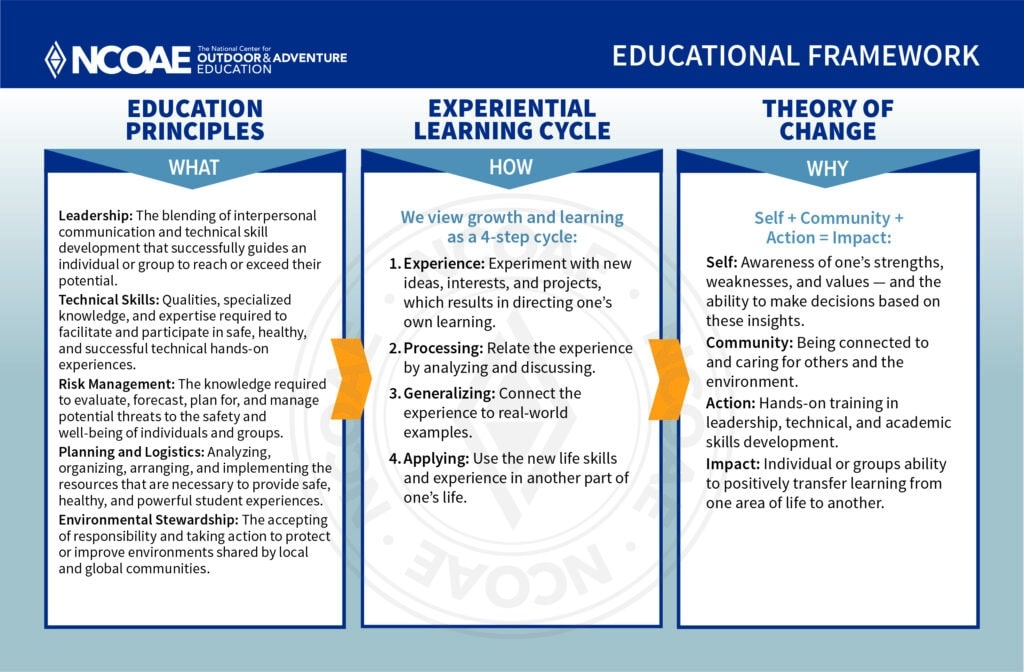Trending: Restorative Practices in Outdoor-based Experiential Education
March 22, 2023
A few weeks ago, we published Part 1 of this series, which covers what we here at The National Center for Outdoor & Adventure Education (NCOAE) view as the trending best practices to know about in outdoor and adventure-based experiential education.

- Here, in Part 2 of this series, we introduce you to Restorative Practices, and share how they’re incorporated in the programming here at NCOAE.
- For Part 3, we will shift our attention to Trauma-Informed Learning.
- And we’ll wrap up the series in Part 4 with a discussion on Stewardship.
At NCOAE we recognize the power of the outdoors and how it can shape the lives of those who participate in our outdoor education courses and wilderness medicine trainings. Take a backcountry teen expedition for example. By experiencing hiking, climbing and paddling, we see physical obstacles turn into calculated challenges that are chosen to be overcome by the individual.
In parallel we see an improvement in social and emotional well-being. However, NCOAE — and now other organizations — are digging deeper into intentional restorative practices to help manage the individual and group dynamics that naturally occur during a backcountry or wilderness expedition.
What Are Restorative Practices?
Restorative practices in education refer to a set of principles and practices that prioritize repairing harm and restoring relationships in communities. These practices are based on the idea that when harm is done, it is important to focus on the needs of the individuals affected and to work collaboratively to address the harm, rather than simply imposing punishment.
Restorative practices are seen as a series of processes that help individuals or groups identify wrongdoings, using steps learned in order to repair harm. These individuals are then able to be welcomed back into a community, or to welcome others as they reenter a community.
Restorative practices in outdoor education can take many forms, including peer mediation, restorative conferences, circles, and restorative justice. These practices can be used to address a range of issues, from minor conflicts to more serious incidents of harm or wrongdoing.
The objective of restorative practices in outdoor education is to build and maintain strong, positive relationships among members of the expedition community, and to create a sense of accountability and responsibility for one’s actions. By focusing on restoration and relationship-building — rather than punishment and exclusion — restorative practices can create a more positive, inclusive, and supportive expedition environment that promotes learning and growth for all students.
Restorative Practices at NCOAE
Here at NCOAE, we are deliberate about how restorative practices are built into our culture and courses.
How do we do this?
- With the use of group “circle ups” (everyone gathering in a circle with intent).
- Proactively teaching “statements” how to make them and receive them (feedback)
- Teaching strategies/practicing in relation to positive social and emotional learning/leading
- By deliberately entering into “Restorative Conversations” that teach personal and group restoration.
- By facilitating impromptu meetings (one-on-one or in small groups) to address incidents or concerns. “Restorative Interventions” (catching the small things before they become big things)work because of the formal lessons and conversation that deliberately occurred earlier in a course.
- Through whole group “Restorative Meetings” (practice process)
- Morning meetings
- Evening “Summits”
- Through formal “Restorative Conferences”, typically one-on-one.
The restorative process tends to move in and out of formal and informal meetings. The theory is we can use formal practice, teachings, and understanding to move toward more fluid informal meetings and conferences. This produces less stress, friction, and failure within the community and leads to higher success rates when dealing with hard conversation, goal and objective setting and achievement.
As you can see, restorative practices are not an accident. They are deliberate and proactive.
At NCOAE, we have created, reflected upon, and revised our social and emotional learning (SEL) practices and Restorative Education over the last decade. We have seen amazing results and have built these lessons in a way that supports our “Theory of Change,” which can be viewed as part of the NCOAE Educational Framework:

If you want to learn more about how NCOAE courses work, our intended outcomes, and our journey using Restorative Practices, take a course, or let us help you develop a custom course where you can witness firsthand the power of the outdoors. Call us at (910) 399-8090.
– – – – – – – –
About the Author: Stephen Mullaney is the Director of School Partnerships at The National Center for Outdoor & Adventure Education (NCOAE). He has worked domestically and internationally with schools, organizations and wilderness programs. His classrooms have ranged from dilapidated trailers at overcrowded, underfunded schools to the Himalayan mountains and everything imaginable in between. His past students include gang members/prisoners, education majors, college and university professors, and pioneers in the field of outdoor and adventure-based experiential education. Stephen’s philosophy is to focus on the development of positive working and learning environments. He brings more than a quarter of a century of education experience and understanding of human nature to any organization, whether it is an education institution or a private company. His writing has appeared in adventure sports/education journals, magazines and on the web. Stephen prefers to arrive by bicycle and sit in the dirt.
TALK TO US
Have any further questions about our courses, what you’ll learn, or what else to expect? Contact us, we’re here to help!
Leave a comment